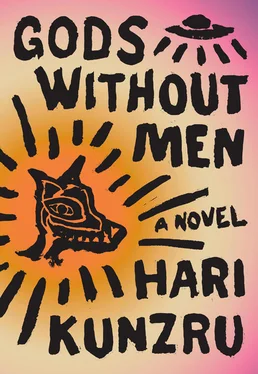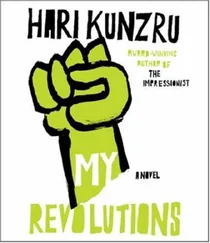Of course Lisa understood something of the “cultural differences” (that glib dinner-party phrase) between her upbringing and his own, but she had no idea, not really, of the vast territories he had to straddle to keep both her and his family in his life. His mom and dad were straight out of Jalandhar, betrothed to each other at some improbably early age, their childhoods played out in small villages against a backdrop of wheat and yellow mustard fields. Three days after their wedding his dad set off for America to join Uncle Malkit, who’d made a life in East Baltimore. Together the two cousins worked in a body shop owned by a Pole called Lemansky. In their family legend Mr. Lemansky was a typical white boss, greedy and tyrannical, cheating Malkit and Manmeet out of overtime, mocking their religious observances and their faltering English. Jaz suspected that in reality he was no worse than the next guy, struggling, bemused by the changes in his neighborhood, by the dark-skinned men who were the only ones willing to work for the low wage he could afford to pay. After two years of car parts and engine oil, his dad left to work on a production line assembling power tools. Soon afterward, he sent for Mom, whose first experience of America was in a factory packing candy bars with hundreds of black women. She didn’t mix with them, sticking to her own coven of Punjabis at a corner table in the canteen. Jaz could picture them, their long braids tucked into hygienic hairnets, eating their carefully packed lunches of dal roti and warding off the new world and its kala people with acid remarks and superstition.
This was how you did it. Work hard; keep away from the blacks; remit money home for weddings, farm equipment, new brick-built houses whose second or even third stories would rise up over the fields to show the neighbors that such and such a family had a son in Amrika or U.K. Wherever in the world you happened to be, in London or New York or Vancouver or Singapore or Baltimore, Maryland — you really lived in Apna Punjab, an international franchise, a mustard field of the mind. All the great cities were just workhouses in which you toiled for dollars, their tall buildings and parks and art galleries less real than the sentimental desi phantasm you pulled round yourself like an electric blanket against the cold.
All the aunties worked at the same place as Jaz’s mom, except the ones who had jobs as cleaners at Johns Hopkins, or were on the line at the condom factory. The uncles drove taxis. By the time Jaz was born, the son his parents had prayed for after two disappointing daughters, the family had moved out to the country, near the Gurdwara, an anonymous storefront with curtains in the window and a hand-lettered sign on the door. This was the center of their social life, a round of shaadis and festivals; dozens of people squeezed into cramped apartments and row houses, sitting on the floor, singing kirtans. White sheets stretched over patterned carpets, garlanded pictures of the gurus in plastic gilt frames. As a small boy wearing a new kurta-pajama, straight out of the box and scratchy on the skin, Jaz never imagined there was any other world. Running his fingers along the crisscross cotton folds on his chest, he’d pick his way through ranks of chanting worshippers into kitchens full of frying smells and forests of silk-clad female legs that could be tugged at to produce henna-patterned hands that reached down to adjust his topknot or give him a morsel of food. A safe bubble for a cherished little boy. As he got older he saw that for all the mithai and cheek pinching, this bubble was also paranoid and fragile and small, sensitive to the slightest touch of the wider world, the appearance of a police officer or even the mailman at the door. His mom would shake her head, pull her dupatta over her face and call for the kids, the English speakers, to find out what the gora in the uniform wanted. Always the suspicion that he was there to take something away from them, some old-country memory of tax collectors, landlord’s thugs.
Jaz could never understand why his mom and dad were so scared. He lived his life in B-more, not the Punjab. He went to a school ruled by black kids, Americans, not the other blacks, the Somalis and French speakers who came from families as adrift in the country as his own. He spoke English, recited the pledge, knew the capitals of the fifty states. He met plenty of white kids, Americans and new immigrants from Slovakia and Poland and the Ukraine. He met Latinos. He and the other “Asians,” Vietnamese and Pakistanis and Iranians and Tamils, none numerous enough to form their own clique, counted for little in the school hierarchy, but even as a skinny brown kid with freakishly long hair, he felt American. He played baseball, not cricket. He listened to the top forty on his Walkman. He’d go to the park with his family and the big world would parade before them, the Frisbee throwers and joggers and sunbathers, the crazy old ladies and baggy-shirted skateboarders, all seeming so free and easy, sharing the open space. Meanwhile his mom and dad would be delineating their boundaries by laying down blankets, huddling with the children over tiffin carriers and Tupperware containers of food, too timid even to bring a radio.
But, Mom, why can’t I go? It’s just a rock concert, just music .
You have your studies, beta .
His studies. Always that. Luckily he was clever. Math and science were his subjects. He could make numbers do the things he wanted. And just as he could see the patterns in an exponential or a logarithm, he could see there were other kinds of life to be led than his, lives that involved going on foreign vacations, having piercings, keeping a pet dog or a garden or a boat in the marina, playing with your band on MTV, locking your bike outside the vegan coffee shop and necking with your dreadlocked girlfriend. In such a life you could meet gora girls with short skirts and long legs, who’d talk to you instead of holding their noses and pretending to be disgusted by the phantom odor of curry. For a while, these girls were the sole focus of his life, girls in his class, in the neighborhood. Becky and Cathy and Carrie and Leigh … There were insuperable barriers to becoming their friend, let alone sleeping with them. His geeky Asian-ness. His hair. Above all, his hair. By fifteen he’d swapped the topknot for a turban, but even then he had a carpet of soft down on his chin and long black wisps snaking along his jaw, a mess of unruly and undeniably childish growth that made the hormonal chaos of his adolescent skin look even worse. He was a monster, a pariah.
Some of the other Sikh boys did the unthinkable. They went to the barber. They endured their dads’ beatings, their moms’ tears. As if to taunt their more compliant brothers and cousins they began to spend hours in front of the mirror, shaving complicated fades and pencil-thin beards, teasing out fierce patterns of gelled spikes. They dressed like gangsters, smoked dope, drove their pimped-out rice-burner cars down to bhangra dances in D.C. They were the real Punjabi shers, the brave-hearts, always ready to go after the dirty black bandars walking on their block, the sick slut who dated white boys. Jaz couldn’t have copied them if he’d dared. He was a nerd, a mathlete. On the fridge in his parents’ kitchen was a yellowing photo of him, aged sixteen, standing behind his prizewinning statistics exhibit at the city science fair. He always noticed his eyes in that picture. Glazed, fixed on escape.
Everyone had heard of MIT. Uncle Daljit had even visited the campus on some kind of tour. It was A-number-one, the best. Of course Jaz would need a scholarship, but his teachers said that wasn’t impossible. He was an exceptional student, gifted. How good that sounded in his parents’ ears. Our gifted son . So it was decided: Jaz would try for MIT. The household organized itself round the mission. The television was muted. Meals were brought up on a tray. His mother and sisters moved around like ground technicians on an immigrant moon shot. He was too self-absorbed to wonder why similar weight had never been put on the ambitions of his sisters. What had Seetal dreamed of before the hospital laundry? Or Uma, who packed chocolate bars alongside their mom? Both girls had been married by the age of twenty-one. No scholarships for them, just Uncles Amardeep and Baldev.
Читать дальше












